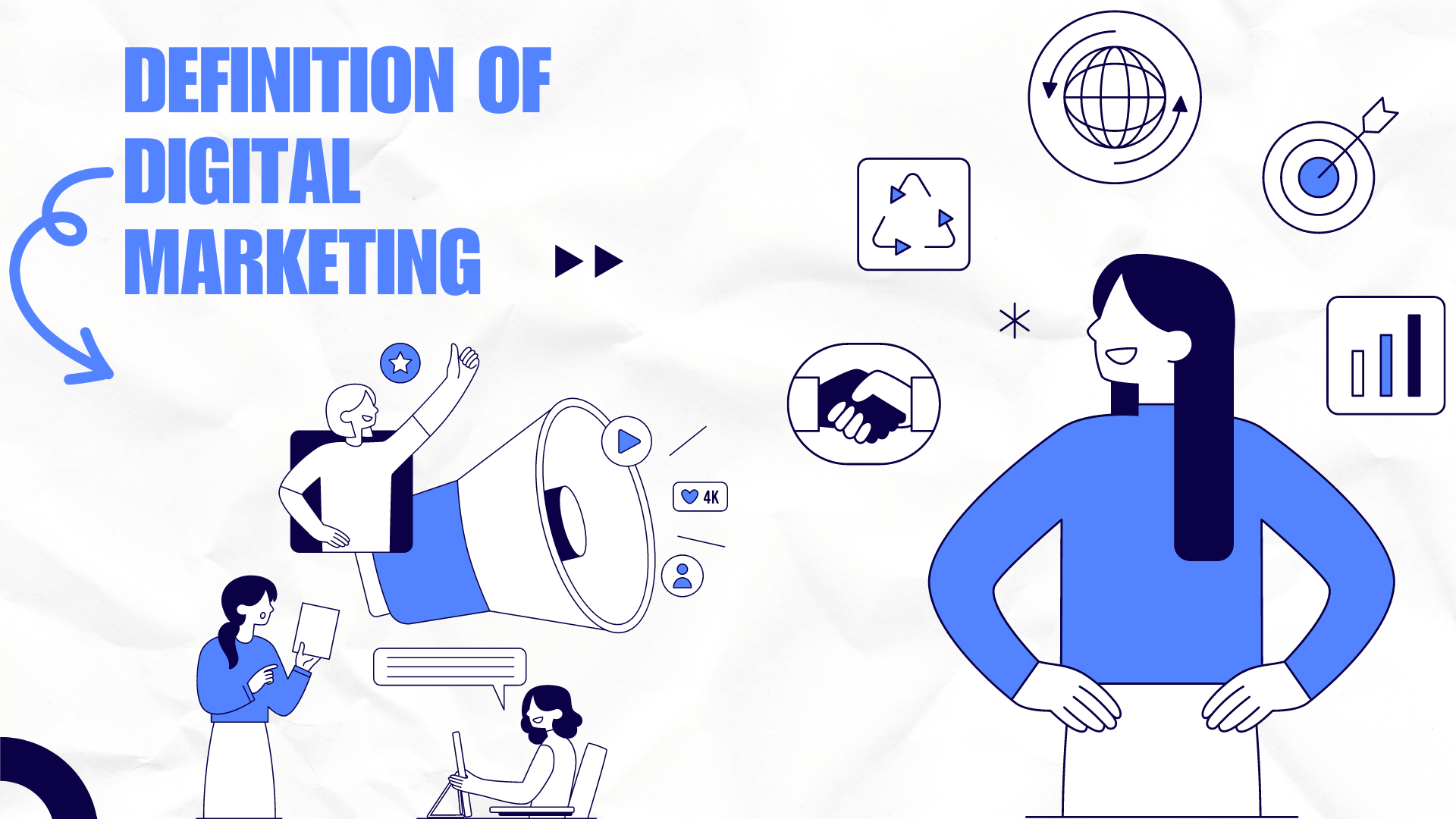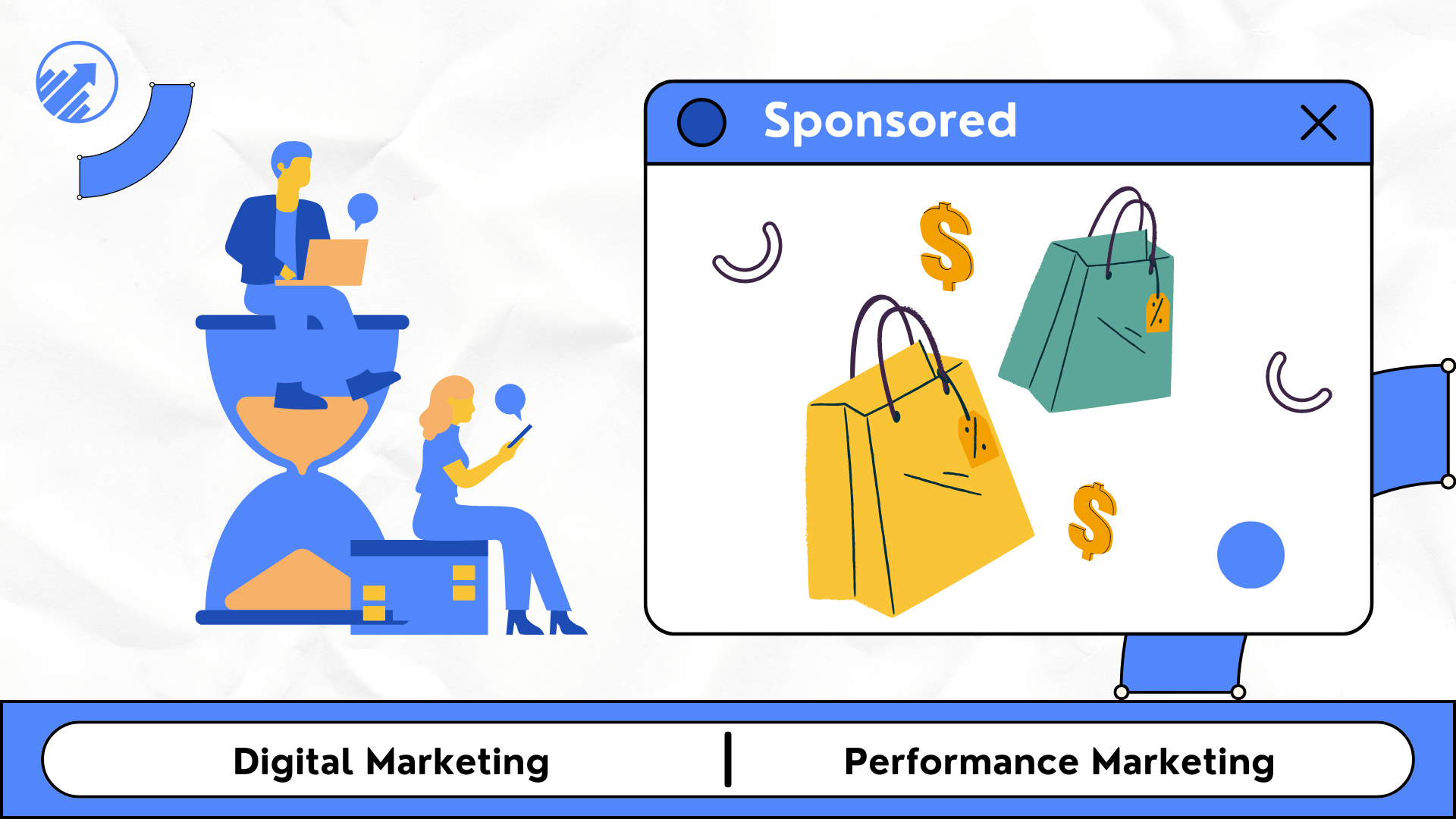Performance Marketing vs. Digital Marketing: Deep Overview
Business success depends on recognizing marketing strategy differences in today’s fast-paced online world. People regularly use Performance Marketing” and “Digital Marketing.” These two strategies differ in how they distribute money, how long they take to reach their objectives, the emphasis and material used, and the analytical methods applied.
This article compares performance marketing vs digital marketing and shows when to employ either based on business aims, money, and resources.
What is Digital Marketing?
 Internet marketing includes all online and electronic device marketing. Businesses reach customers via search, SMM, email, and websites. Although this variety, web marketing is largely built on establishing a relationship between users and brands. This helps to explain why the business will be selected above others.
Internet marketing includes all online and electronic device marketing. Businesses reach customers via search, SMM, email, and websites. Although this variety, web marketing is largely built on establishing a relationship between users and brands. This helps to explain why the business will be selected above others.
Broad Scope of Digital Marketing: Channels and Strategies
Online marketing encompasses:
- SEO — is meant to raise natural search results.
- Content Creation is the production of worthwhile information meant to draw in and interact with people.
- Social Media Advertising targets markets through leveraging platforms.
- Email marketing serves to preserve client ties and cultivate leads.
Digital marketing strategies have many advantages over traditional marketing. Cost-effectiveness is another strength. Online marketing costs less than traditional marketing.
Digital marketing’s worldwide reach is considerable. Every brand will reach various goals by interacting with its consumers on all possible platforms, using all acceptable marketing channels.
Key Components: SEO, Social Media, Content Marketing, Email Marketing
-
Search engine marketing
SEO is making your website more likely to show higher in Google results, thereby generating more natural (non-paid) visitors. This covers working with other platforms, improving the technical functionality of the site, and producing useful information for users.
- Social media campaigns
SMM helps to accomplish all of these goals: build brand awareness and community, website traffic.
- Content Development
Content is about producing and delivering worthwhile, relevant material. The brand can leverage its own experience, intriguing facts, and free knowledge to do this. This teaching role makes this marketing so good — it reveals the business’s niche expertise.
- Emails
Email marketing aims to advertise goods, services, or brand messages to both possible and current consumers. For client retention and lead creation especially, it is quite successful.

Long-Term Branding vs. Immediate ROI
Every kind of digital advertising has several significant features and usually requires some time to give results. The measurement of results is based on the actions performed; so, often the brand pays for the work that will be done and the outcome that will be acquired in the future. So, online marketing takes time but builds brand exposure and consumer loyalty.
Results-based marketing, meantime, is always about return on investment. In this instance, the company might pay for a click, a purchase, or a lead — a particular interaction.
Understanding the specifics of each can help you better comprehend the distinction between digital marketing vs performance marketing. After all, the correct choice of promotion instruments guarantees future success. When contrasting these two strategies, you should also consider that occasionally they overlap and can take advantage of shared tools. Still, knowing them will help you decide which approach is best for your company.
What is Performance Marketing?
One may classify result-based marketing as one of the subtypes of online marketing as such. Nevertheless, it is quite crucial to differentiate them as their functioning ideas differ. Results-based marketing firstly lets companies pay for a previously chosen activity or objective, and also tracks and optimizes campaigns using performance measures. This ensures that every dollar spent meets the business goal and illustrates the benefits of using performance marketing for lead generation.
Definition and Focus: Measurable Results and ROI
A strong emphasis on tracking and optimizing for measurable outcomes drives result-based marketing — which is quite data-driven. This strategy guarantees effective utilization of marketing dollars by allowing advertisers to directly connect their expenditure to results.
Digital and performance marketing use ROI measurement to compare investment profitability against cost. Subtracting the investment cost from total revenue, dividing by the cost, and multiplying by 100 gives the ROI percentage. A high ROI suggests the investment outperforms its cost, while a low ROI may demand strategy and spending changes.
Key Channels: PPC, Affiliate Marketing, Sponsored Ads
PPC (Pay-Per-Click) marketing charges advertisers per click. This strategy lets firms buy traffic instead of SEO. Marketers can target ads in search results, SMM, and other sites. Businesses can reduce advertising expenses and increase visibility in saturated areas by carefully choosing keywords and managing bids.
Businesses pay affiliates to boost traffic or purchases through their marketing activities. Affiliates earn commissions on sales by promoting a brand’s products or services using conversion tracking. This channel helps businesses reach more people with less upfront expenditures, while marketers may use their audience to make money.
Sponsored Ads are paid ads that mix into platform content. They appear in online media, search results, and website content. Sponsored offers boost brand recognition and target specific market segments, ensuring potential clients see their message. These adverts help marketers position products for immediate engagement and conversions.
Metrics-Driven Approach: KPIs and Performance Tracking
Key performance indicators (KPIs) in digital marketing help firms and marketers evaluate their advertising efforts. Businesses can make decisions based on data when they use a metrics-driven method, which leads to better results and better use of resources. It also gives you useful information about how your customers act, which lets you make more focused and personalized campaigns.
Differences Between Digital Marketing and Performance Marketing

Online marketing:
- Strategy: Broad, holistic approach
- Goals: Brand positioning, customer engagement, long-term growth
- Measured by traffic, engagement, brand sentiment
Result-based marketing:
- Strategy: Targeted, action-driven approach
- Goals: Immediate conversions, sales, measurable ROI
- Measured by сonversions, CPA, ROI
When to Use Digital Marketing vs. Performance Marketing
Internet marketing creates brand exposure, customer involvement, and long-term loyalty. It allows firms to establish brand equity and engage with their audience over time.
- Used in luxury and high-end product corporations where brand perception matters.
- Recommended for firms with a bigger marketing budget because it needs consistent work and investment.
Performance marketing is ideal for organizations seeking rapid sales or leads.
- Ideal for e-commerce and lead creation, when conversion rates matter.
- It targets precisely and uses budgets efficiently, making it suitable for small enterprises.
-
Effectively complements digital marketing methods for a balanced strategy.
Business Goals: Brand Awareness vs. Direct Sales
Brand recognition is necessary for long-term growth. Companies seeking to stand out in competitive industries must build customer trust and familiarity. Brand recognition helps organizations build a loyal, connected client base.
Direct sales prioritize quick outcomes and revenue. This strategy is crucial for organizations with restricted budgets or quick cash flow. Direct sales produce immediate returns but may not establish brand loyalty like awareness campaigns.
A business’s optimal strategy depends on its goals — balancing brand awareness and direct sales can boost income and growth. For example, it can be useful for a business combining SEO with performance marketing for better results. In this sense, your company will be able to create sales through paid advertising right now while receiving continuous traffic in the future.
Industry Examples: Scenarios Where Each Approach Excels
Digital marketing:
- a fashion company building a lifestyle brand with social media marketing and influencers.
- a tech corporation building thought leadership and educating its audience via content marketing.
Result-based marketing:
- running PPC advertising, an e-commerce store aims to boost instant sales during a promotional time.
-
an affiliate marketing software firm creates leads and conversions via partner referrals.

Budget and Resources: Balancing Both Strategies
Financially combining digital marketing vs performance marketing requires a strategic budget allocation methodology that promotes immediate ROI and long-term brand health. Businesses should periodically evaluate their marketing budget and objective indicators to identify which techniques provide the highest ROI. Analytics tools help firms compare client acquisition expenses to lifetime value and modify budgets.
Tips and best practices for integrating digital marketing and performance marketing:
- Set a purpose for each type of advert. This aligns strategies and tracks their effectiveness.
- Ensure brand messaging and tone are consistent across promotions. Brand identity is strengthened by consistency, improving recognition across both techniques.
- Promote information and strategy sharing between both teams.
- Retarget digital content viewers who haven’t converted.
-
Make the interaction process enjoyable independent of the form of communication. A smooth journey increases brand loyalty and sales.
Measuring Success Across Both Strategies
To get better outcomes in the future, any marketing efforts must be evaluated for efficacy. Particularly when comparing performance marketing vs. digital marketing, as performance indicators are the easiest method to distinguish between different techniques.
Thus, let’s consider what metrics support the evaluation of advertising’s efficacy and their computation techniques.
Essential KPIs for Digital Marketing: Traffic, Engagement, Brand Sentiment
KPIs that measure engagement and conversion are needed to evaluate Internet marketing efforts. Some key KPIs and measurement methods:
- Traffic: This counts website visitors. Google Analytics can reveal site visitors and their behavior.
- Engagement: This KPI measures SMM content engagement. It can be assessed by post likes, shares, comments, and time. Social media analytics tools illuminate these metrics.
- Brand Sentiment: How people feel about your brand. This can be measured by surveys or sentiment analysis.
-
Conversions: The conversion rate shows the percentage of users who buy or sign up for a newsletter. Divide the number of conversions by the total visitors and multiply by 100.
Performance Marketing Metrics: Conversions, CPA, ROI
By looking at these measures again, businesses can see how their objective marketing strategies are working and make changes to make their companies run better.
- Conversions: Track particular actions like purchasing, and filling out a contact form to correctly measure conversions. The conversion rate — the number of conversions divided by the total number of visitors — will reveal your campaign’s success.
- Cost Per Acquisition: CPA is the overall cost of gaining a customer through a marketing campaign. Divide the campaign budget by conversions to calculate CPA.
-
ROI: Use the calculation to assess performance marketing’s profitability: (Revenue – Cost) / Cost. This gives you a return on investment percentage. An ROI above 0% implies a profitable campaign.
Tools and Techniques for Monitoring and Optimization
Digital Marketing Tools:
-
Google Analytics, SEMrush, and Moz for SEO and web analytics.
- Hootsuite, Buffer for social media management.
-
Mailchimp, HubSpot for email marketing.
Performance Marketing Tools:
-
Google Ads, Facebook Ads Manager for PPC advertising.
- Partnerize, ShareASale for affiliate marketing.
- AdEspresso, Optimizely for tracking and optimization.
In conclusion, performance marketing vs digital marketing have different benefits depending on your business goals, budget, and resources. With the right approach, you can expand and succeed by building brand equity or driving instant revenue. At Webugol, we specialize in creating customized marketing plans that deliver both long-term growth and immediate results. Contact us today to start optimizing your strategy for success!


